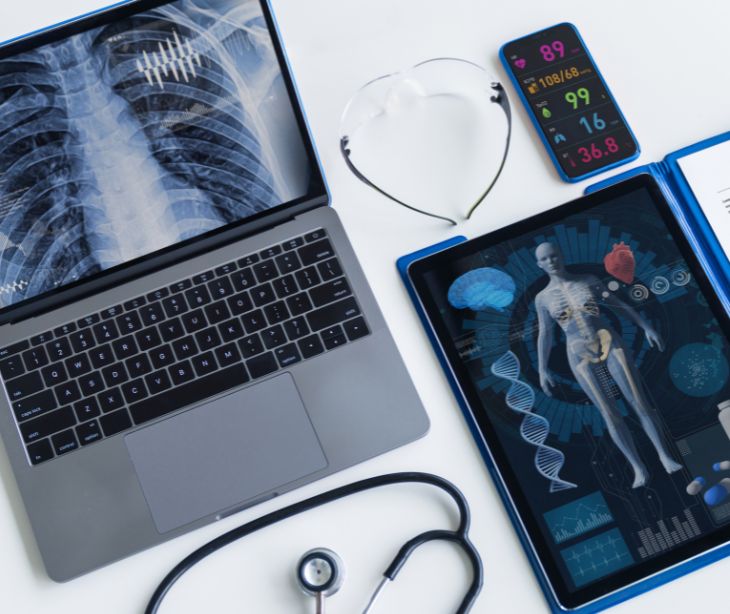
Healthcare CRM focuses on patient relationships and engagement, while EHR is centered on maintaining comprehensive and secure health records.
What is a healthcare CRM?
A healthcare CRM (Customer Relationship Management) system is a specialized software designed to manage patient relationships, interactions, and data within healthcare settings. It's tailored to the unique needs of healthcare organizations. It focuses on improving patient engagement, care coordination, and overall patient experience.
Related: What is CRM?
Functions of healthcare CRM
- Patient-centric engagement: Centralizing patient data to facilitate seamless communication, personalized care plans, and targeted health initiatives.
- Enhanced communication: Providing tools for follow-ups, reminders, and patient communication channels, improving engagement and satisfaction.
- Segmentation and targeting: Segmenting patient populations to tailor outreach efforts and interventions for specific healthcare needs.
- Workflow optimization: Streamlining administrative tasks and workflows, freeing up resources for better patient care.
- Analytics-driven insights: Offering data-driven insights for informed decision-making, improving operational efficiency and patient outcomes.
Data focus
Healthcare CRM systems manage and utilize patient-related data to enhance patient care, engagement, and overall healthcare outcomes. The data managed within healthcare CRM systems revolves around patient information, interactions, and engagement within the healthcare ecosystem.
User base and integration
The user base of healthcare CRM systems encompasses various healthcare professionals and administrative staff involved in patient care and engagement. “A CRM system reaches its full potential when it’s connected with other applications and software,” says Forbes Advisor. Integration with other healthcare systems ensures that CRM platforms deliver comprehensive patient information and enhance operational efficiency within healthcare institutions.
See also: HIPAA Compliant Email: The Definitive Guide
What is EHR?
Electronic health records (EHRs) are a digital version of a patient's paper chart, containing their medical history, diagnoses, medications, treatment plans, immunization dates, allergies, radiology images, lab test results, and other health-related information. EHR systems are designed to streamline the storage, retrieval, and management of patient health information within healthcare settings.
Go deeper: What is an electronic health record (EHR)?
Functions of EHR
- Comprehensive health data storage: Digitizing and storing patient medical history, treatment plans, lab results, and imaging data for accessibility and care continuity.
- Care coordination: Facilitating communication among healthcare providers to ensure informed decision-making and seamless care delivery.
- Patient safety and compliance: Providing alerts for potential issues such as allergies or drug interactions, while ensuring compliance with regulations like HIPAA for patient data security and privacy.
Data focus
EHRs handle sensitive and comprehensive patient data, ensuring accuracy, accessibility, and security. These records are essential for healthcare professionals to make informed decisions, coordinate care across providers, and maintain a continuum of patient treatment.
Regulations and compliance
EHR systems are subject to stringent regulations like the Health Insurance Portability and Accountability Act (HIPAA), which govern the privacy and security of patient information. Compliance with these regulations is non-negotiable, ensuring patient confidentiality and data integrity.
Related:
FAQs
How do healthcare CRM and EHR systems differ in their primary functions?
Healthcare CRM focuses on managing patient relationships, engagement, and communication. It supports marketing, patient acquisition, and retention efforts. On the other hand, EHR systems focus on clinical data management, ensuring accurate and up-to-date patient medical records for healthcare providers.
Can healthcare CRM systems handle clinical data?
While healthcare CRM systems can store some clinical data to enhance patient engagement, they are not designed to handle comprehensive clinical data management like EHR systems. They typically integrate with EHRs for clinical information.
How do healthcare CRM and EHR systems impact patient data accessibility?
Healthcare CRM enhances accessibility by providing patient engagement data to marketing and administrative teams, helping them manage relationships and communications. Conversely, EHR ensures that healthcare providers have immediate access to comprehensive and up-to-date medical records, improving clinical decision-making and care coordination.
Subscribe to Paubox Weekly
Every Friday we'll bring you the most important news from Paubox. Our aim is to make you smarter, faster.




